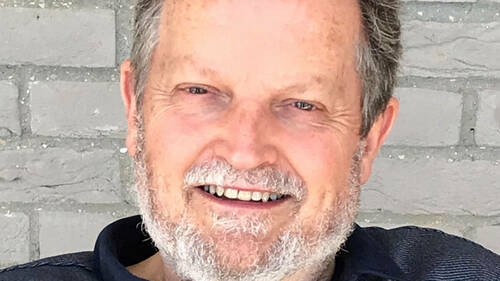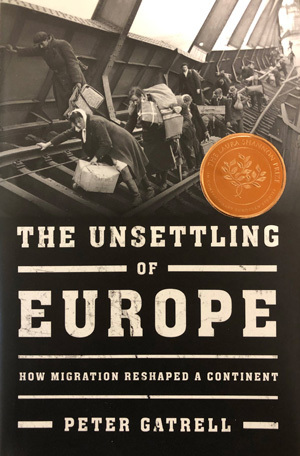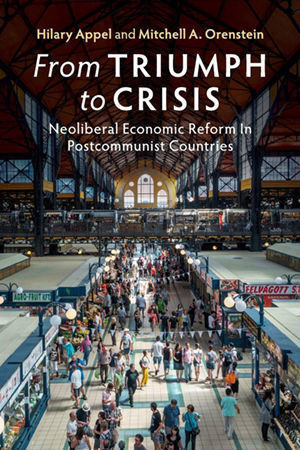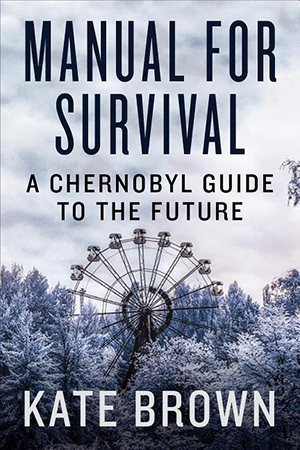
The Nanovic Institute for European Studies at the University of Notre Dame has awarded the 2021 Laura Shannon Prize in Contemporary European Studies to Peter Gatrell, professor of economic history at the University of Manchester, for his book “The Unsettling of Europe: How Migration Reshaped a Continent,” published by Basic Books.

The $10,000 Laura Shannon Prize, one of the preeminent prizes for European studies, is awarded each year to the author of the best book that transcends a focus on any one country, state or people to stimulate new ways of thinking about contemporary Europe as a whole. This year’s award considered books in history and social sciences published in 2018 or 2019.
Placing migration at the center of postwar European history, and the aspirations of migrants themselves at the heart of this story, “The Unsettling of Europe” received high praise from the final jury for advancing a more human understanding of Europe, the people who call it home, and those who seek new lives within its borders.
“A sweeping, empathic and deeply human story of post-1945 European migration, Peter Gatrell’s ‘The Unsettling of Europe: How Migration Reshaped a Continent’ is a work of astounding scope and exquisite detail, covering the whole continent, including Russia and the former Soviet satellite states of Eastern Europe, stretching as far as the Caucasus and Kazakhstan. With his compelling focus on individuals and cultures, Gatrell treats migration as a phenomenon inherent to the human experience and thus shared by Europeans East and West, North and South. He constructs his narrative based on prodigious research, interweaving individual testimonials, literature and film with government documents to delineate dramatic personal experiences of migrants — from decisions to leave their homes and endure endless hardships in transit to their reception by the communities they wish to join and integrate into as well as by local and national governments,” the jury wrote.
In the tome, Gatrell examines how migration — both transnational and internal — has been important in shaping both the economy and society in all regions of Europe.
“Far from being a drain on the economy or a cultural detriment to the host societies, as many of the old fallacies suggest and which Gatrell debunks, migrants have made enormous contributions to Europe’s dramatic enrichment and cultural vitality since 1945. In telling Europe’s postwar story through the lens of migration, Gatrell also reminds us of how intrinsic migration and migrants had been to the European experience in the decades, indeed centuries, prior to 1945,” the jury wrote.

The final jury also awarded two Laura Shannon Prize Silver Medals, each of which also carries a monetary prize. One went to Hilary Appel, the Podlich Family Professor of Government and George R. Roberts Fellow at Claremont McKenna College, and Mitchell A. Orenstein, professor of Russian and East European studies at the University of Pennsylvania, for their book “From Triumph to Crisis: Neoliberal Economic Reform in Postcommunist Countries,” published by Cambridge University Press.
The second Laura Shannon Prize Silver Medal was awarded to Kate Brown, professor of science, technology and society at the Massachusetts Institute of Technology, for her book “Manual for Survival: A Chernobyl Guide to the Future,” published by W. W. Norton and Company.
The jury for this year’s prize consisted of an accomplished group of scholars: Pamela Ballinger, professor of history and the Fred Cuny Chair in the History of Human Rights, University of Michigan; Semion Lyandres, professor of history, University of Notre Dame; A. James McAdams, the William M. Scholl Professor of International Affairs, University of Notre Dame; Jan Palmowski, secretary-general of the Guild of European Research-Intensive Universities and professor of modern history at the University of Warwick; and Sonja Puntscher Riekmann, professor emerita of political theory and European politics at the University of Salzburg and research fellow at the Salzburg Centre of European Union Studies.

Now in its 12th year, the Laura Shannon Prize is made possible through an endowment from Michael and Laura Shannon of Houston. Laura has served on the Nanovic Institute’s Advisory Board, and Michael, a 1958 Notre Dame graduate, previously served on Notre Dame’s Graduate Studies and Research Advisory Council.
The Nanovic Institute for European Studies at the University of Notre Dame is committed to enriching the intellectual culture of Notre Dame by creating an integrated, interdisciplinary home for students and faculty to explore the evolving ideas, traditions, cultures, beliefs and institutions that have shaped and shape Europe. The institute is an integral part of Notre Dame’s Keough School of Global Affairs.
The institute is now accepting nominations of humanities books for its 2022 prize. European studies books published in 2019 or 2020 are eligible, with nominations due Feb. 15. For additional information about the Nanovic Institute and the Laura Shannon Prize, visit nanovic.nd.edu/prize.